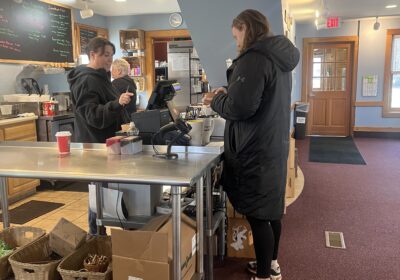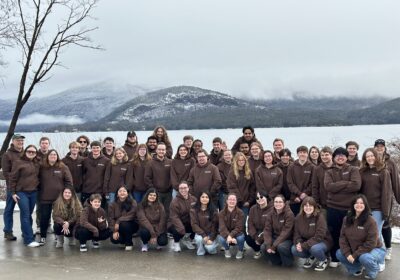Respect, appreciate and love your brain

Kevin Pearce speaks in FAC about respecting your brain.
Christin Martin/Castleton Spartan
On Jan. 28 Kevin Pearce was standing on the stage in the Castleton Fine Arts Center. A week before that he was gliding down mountains of deep powder in Japan.
Five years before that he was lying in a hospital bed in a coma with a traumatic brain injury.
So how did he end up at the Castleton Campus speaking to students about the importance of respecting, appreciating and loving your brain?
In 2009, the Vermont-raised professional snowboarder quickly was being launched into stardom.
“I made it to this place that very few people get to in the world. I became one of the very best competitive snowboarders,” Pearce told students and community members at the Casella Theatre.
He had been brought to Castleton by a collective effort from the Campus Activities Board, Student Government Association and the nursing program, whose members all thought his message was one the students needed to here.
Director of CAB, David Ievolli, had the initial idea to bring him to campus and everyone else quickly jumped on board.
Pearce was living his dream and only planned on going up. He was an Olympic hopeful, the one to watch, and he was just a few degrees of rotation away from landing the trick that would get him there.
On Dec 29, 2009 Pearce was training in Park City, Utah when his dreams and almost his life abruptly ended with a fall.
Less than two weeks prior, Pearce had taken a fall and sustained a severe concussion, but he was in the middle of a competition so he shook it off and pretended it didn’t happen. That’s where he went wrong.
Ten days later, when he took the fall that would end his career, his concussion had not properly healed. The fall he took on that run would have been bad regardless, but he was already concussed.
“Your brain can not be injured and hit as hard as I hit it twice in that span of time. It has got to heal,” he explained.
But his brain didn’t heal, and that resulted in a life-threatening traumatic brain injury. He spent six days in a coma with a broken eye socket and bleeding in his brain. When he woke up he could barely see, he couldn’t speak, he couldn’t swallow, and he could hardly move.

Students gather after event to hear more from Pearce about his life experiences.
Christin Martin/Castleton Spartan
After about six months of critical care and rehabilitation, Pearce was finally able to return home to Vermont with his family.
Today he still has trouble with his eyesight, but has regained full physical function through grueling rehab.
Athletic training student, Colleen Jenkins, thought Pearce’s story was very important for Castleton students to hear.
“Athletes feel like they’re invincible. Hearing this might make them realize that they are not,” Jenkins said. “People don’t really view brain injuries as very common, but it can happen to anyone.”
It happened to Pearce, and he could no longer snowboard professionally without risking his life.
So now what?
“I can’t just be done. I’m 27,” Pearce said. “And what I’m doing with my life now is loving my brain.”
In 2014, Pearce and his brother Adam started the LoveYourBrain Foundation. It is a “non-profit organization that is working to connect, educate and empower people to live a brain healthy lifestyle.”
You might assume Pearce would just be preaching about safety while snowboarding and the importance of wearing a helmet, but it’s much more than that. The foundation is about mental as well as physical health.
It’s about positivity. It’s about mindfulness. It’s about distancing yourself from the constant lure of technology.
These are the values Pearce adapted after his brain injury, and they are the values he hopes to instill in others with the LoveYourBrain movement. It is their hope that they can use these tools as a new way to approach brain injury prevention, recovery, and brain health.
Senior Health Science major Sarah Bergstrom thinks these values are incredibly important for college students to be aware of.
“He has a great message about giving your brain time to heal and TBI awareness,” Bergstrom said. “But I also like how he incorporates everyday brain health as well and how important it is to stay positive with our thoughts.”
Pearce left his audience with three simple things everyone can do to love their brain.
The first was to care. Care for and love your brain like you love your girlfriend, love your boyfriend, love your dog. You’re not going to do things to hurt them. Don’t do things to hurt your brain.
The second was to stop. Stop, wait and think before you do something that could hurt your brain.
The third was to do. Do everything you can to protect your brain. It will give you everything, if you just give it some love.






